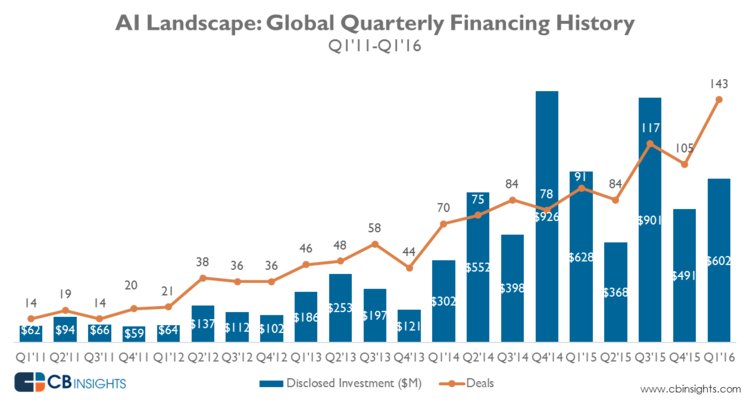How Will AI Affect Real Estate?
Oct 20, 2016

Once the stuff of science fiction, Artificial Intelligence now plays a significant role in our daily lives, giving our cars, websites, wearables, and apps the ability to learn and adapt to our behavior.
Since 2010, CB Insights found that AI startups have raised an aggregate $967M, with AI sector funding multiplying nearly sevenfold between 2010 and 2015. Furthermore, some estimates predict the AI market size to reach $11.1 Billion by 2024*. Yet despite its explosive growth, many experts say artificial intelligence is still in its infancy.
*Due to the inherent vagueness of the term, AI valuation is notoriously difficult - read more on this here.

Courtesy of CB Insights
Still, it has become increasingly clear that AI has massive potential to revolutionize labor markets and the real estate industry is no exception. As The Real Daily recently noted, real estate labor is a natural target for AI application. As such, AI has attracted both interest and concern from industry professionals. The main question being discussed is - just how indispensable is a real estate broker? Rob Hahn recently raised such a concern in a recent article:
“...rote procedures and manual inputs are being displaced by technology. Why would it be any different for the rote procedures and manual inputs in the real estate business?
Answer: it won’t.
Those real estate agents who survive will have to be ‘upskilled’ and focus on niche areas or ‘be equipped to handle smart systems."
On the other hand, some brokers such as Russ Cofano have expressed a more optimistic outlook:
“Cognitive computing has the potential to add massive value to the real estate brokerage value proposition and do for agent professionalism what no other initiative could touch.”
So will the bot replace the broker? Luckily for us, Inman put this question to the test last April and pitted a bot against a broker to identify which was better at predicting buyer preferences. Unfortunately for the brokers, the bot was victorious picking the buyer’s favorite home all three days of the experiment. Does this mean that brokers should start looking in the classified section? Not quite. As Stacie Staub, a participant in Inman's experiment, pointed out she didn’t have the opportunity to get to know the buyer and therefore couldn’t use the most valuable weapon in her arsenal - the ability to connect with the consumer. Greg Eckler who also participated in the experiment, had a similar experience:
“I guess that we weren’t any better than the algorithm during this challenge — because thankfully, that’s where the value of human interaction is truly priceless: in best serving the client throughout the process.”
So who won this battle - the machine or man? It might not be that simple. Regardless of which side of the conversation you choose, it's undeniable that the future is coming faster than we think. Technology is posed to disrupt nearly every industry in the coming years and real estate is far from the exception. Technological innovation has always, and will always, raise these kind of complex questions. However, it's important to keep in mind that disruption is not synonymous with destruction. Viktor Franz Paul Weber echoed this idea in a recent article:
“The fear of disruptive innovations can often be traced back to the fear of the unknown and the fear of unemployment. And that fear may not be unwarranted; technological innovations often create seismic shifts in society as well as business....That’s also the reason it is of great importance to start brainstorming about how you can use these disruptions to your advantage, instead of being surprised—and potentially made redundant—by innovative competitors. While artificial intelligence may make many professionals redundant, it will also create new business cases that savvy innovators can take advantage of.”
Tagged: metaprop
